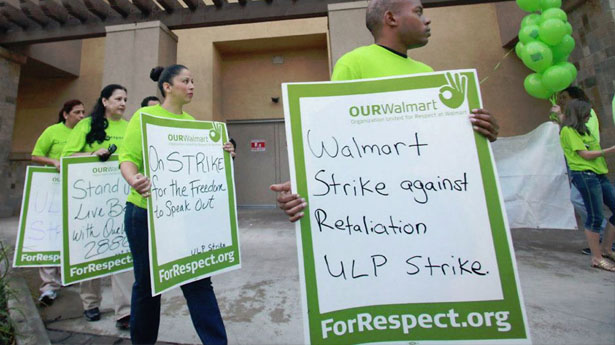by Matthew Adams
November 21, 2012
If you live in the United States and pay any attention to labor or progressive news, you’ve no doubt heard about the historic rolling strikes by retail and warehouse workers at Walmart. The strikes have been organized to protest Walmart’s retaliation against employees organizing through new worker organizations backed by the United Food and Commercial Workers union, the Change to Win labor federation, and the United Electrical workers. The strikes are expected to crescendo on “Black Friday” – the day after Thanksgiving – with hundreds of protest actions, including strikes, other work actions, and rallies outside Walmart stores around the country.
Enter your city or ZIP code into this site to find an action near you.

While Walmart has been at pains to minimize the impact of the planned Black Friday strikes, the company filed charges with the National Labor Relations Board yesterday claiming that the strikes are illegal. The company has also begun suggesting more publicly that workers could face discipline for participating. The UFCW today filed charges against Walmart, alleging systematic illegal retaliation against workers.
With 1.4 million workers, Walmart is the largest private employer in the US. The Walton heirs, who together own around 50 percent of the company, are the richest family in the country, worth more than $115 billion. With $443 billion in revenues and almost $16 billion in profits, Walmart dwarfs all of its competitors. The company’s success has been built on a business model that combines outsourcing, offshoring, extreme cost-cutting at the expense of suppliers and workers, and a super-efficient and high-tech logistics operation. Walmart also has a long history of aggressively suppressing union organizing drives. The company has been so successful at instilling fear in its workers that the recent strikes are justifiably considered a historic breakthrough.
On top of the low pay that barely exceeds minimum wage for many workers, Walmart has made it more and more difficult to work full-time, while also hiking employee health care costs. A majority of Walmart hourly workers are women, and the company claims to be the largest single employer of African Americans and Latinos. The fight at Walmart is a struggle against the intensification of economic inequality, a struggle for workers’ rights, and a struggle for social equality. As it begins to feel more and more like a social movement, gaining broad support from communities across the US, it could even be seen as an excellent sequel and continuation of the Occupy movement.
For more information:
Making Change at Walmart
Twitter: @ChangeWalmart
Twitter: Hashtag: #walmartstrikers
OUR Walmart (Retail Workers)
Twitter: @ForRespect
Warehouse Workers United (California)
Warehouse Workers for Justice (Illinois)
National Guestworker Alliance
Stay tuned for reports from the Walmart workers’ struggle over the next few weeks!
